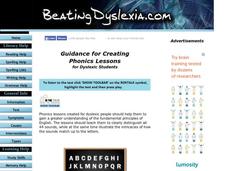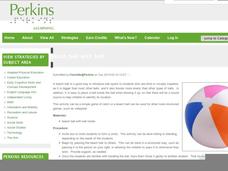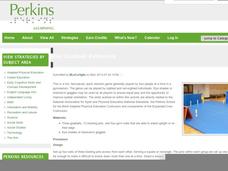Emotional & Behavioral Disorders and Learning Disabilities
Narrative Story Elements Matrix
Readers use a story elements matrix to identify the title, setting, characters, point of view, problem, and solution in four narratives. The template could be used to prepare for a compare/contrast exercise.
Curated OER
Modals: Can, May and Will Verbs: Present Tense
Cover can, may, will, and shall with this lesson on using modals in the present tense. Starting off with a warm-up activity, the resource includes a text to analyze, examples of modals, and exercises with answers. The language in the...
Curated OER
A Differentiated Art Lesson Plan Based on the Work of Andy Warhol
While this lesson plan isn't incredibly extensive, it does provide a base on which one can build a differentiated learning experience. Video, discussion, and visuals are used to assist learners in understanding the elements of art and...
Curated OER
Guidance for Creating Phonics Lessons for Dyslexic Students
Here is a quick and easy guide to help a new teacher build phonics lessons for students with dyslexia. It stresses the importance of fundamental basics while also providing clear and direct instructional practices that will help you...
Perkins School for the Blind
Placemats on Trays
Maybe the idea of putting placemats on trays doesn't sound that great, but it is, especially if you have a physical disability or are visually impaired. This task is one that can be used in a vocational setting and helps develop skills...
Verb is the Word
Passive Exercise 1
Sam really likes coffee, but it's unclear whether Sam drinks the coffee or if the coffee is drunk by Sam. Move from active to passive voice in 12 sentences about Sam's coffee habits. Learners will have to change an irregular verb to the...
Verb is the Word
Passive Exercise 2
Learning the difference between the active voice and passive voice can be difficult. Help your pupils along with a practice exercise. Learners must translate nine active sentences covering a variety of topics into the passive voice. The...
Curated OER
Lesson Five: Introduction to Auxiliary Verbs
If you are interested, you could try out this lesson on auxiliary verbs. Class members get the chance to discuss the difference between can and could in-depth before viewing a presentation that breaks down several auxiliary verbs. After...
Curated OER
Lesson Three: Prepositions
Learning prepositions can be tricky in any language, and English is no exception! Try out the activities described here to help your English language learners grasp the difference between in and on and through and by. After a game of...
Perkins School for the Blind
Warm-Up Exercise with Hula Hoop
To improve mobility, social skill development, and the concept of position, learners with physical disabilities work together to raise and lower a hula hoop over their heads. The activity is short and intended to be used as a warm-up.
Perkins School for the Blind
Beach Ball with Bell
Encourage your learners who are blind or visually impaired to participate in sports or recreational activities. This super simple idea uses a beach ball with a bell on it to help kids become comfortable with playing catch. The activity...
Perkins School for the Blind
Bean Bag on My Head
The world is a very different place to those who are blind. That is why it is so important to have your kids with visual impairments explore the world in many different ways. For this activity, a bean bag is placed on the child's head,...
Perkins School for the Blind
High Stepping
Learners who are blind or have visual impairments learn to take high steps in order to improve their balance and mobility. They start by marching in place, and then march around the room. Finally, they attempt to step over a towel as...
Perkins School for the Blind
Tug of War
Don't be fooled by how short this instructional activity is; it contains a good idea for adaptive PE. The activity is intended to help learners with visual impairments increase motor skills, muscle strength, and mobility. Two kids play a...
Perkins School for the Blind
Mini Goalball Battleship
Here is a game that can be played by both sighted and unsighted children. Floor mats, blindfolds, and bowling pins are used to create a real-life battleship game where each team attempts to knock down the other team's pins.
Perkins School for the Blind
Friction
Friction is a force that can be felt, which means that learners with visual impairments can experiment to feel and understand the concept of friction. They slide a rock along a smooth table, and then they slide a rock across sandpaper,...
Inclusive Technology
Finger Paint With Sounds
Finger painting is fun, but finger painting with sounds is really fun. Finger painting is important for many reasons, it can help children develop a sense of creativity, foster social skills and emotional skills, it helps develop large...
Hump Software
The Writing Machine
Introduce your learners to the letters of the alphabet. They will tap to hear the name of each letter and see a word beginning with that letter appear on the screen. The highly repetitive nature of this app could be a good way to...
John Talavera
Autism iHelp – Sorting
Here is an app that will help kids sort objects! Sorting is an action that promotes cognitive flexibility and executive function. It is a key skill used in categorizing scientific data, making generalizations, and is foundational in...
John Talavera
Autism iHelp – WH Questions
Who, what, when, where, and why questions are often the questions that teachers use to foster engagement, verbal communication skills, higher-order thinking, and hopefully, a deeper understanding of the world. This tool is geared toward...
John Talavera
Autism iHelp – Opposites
In/out, up/down, big/small; understanding opposites is a fundamental vocabulary-building skill. This app uses real-life photographs, to introduce the learner to the concept of opposites. Learning opposites is necessary for understanding...
Nazareth College
Chronological Order
First, next, and last, the elements of chronological order. In every story or text one can find a series of events that occur one after the other. To help learners with visual impairments conceptualize chronological order, this...
Perkins School for the Blind
Rough or Soft?
When a child has some vision they need to be encouraged to use it in a positive and stimulating way. To better understand which types of tactile reinforcers your learner likes best; you'll rub different textured objects on...
Write.com
Complement /Compliment
Have your pupils been mixing up the words complement and compliment? Set them straight with a brief lesson and then assign the quick activity included for some practice. Class members read each of 10 sentences and circle the correct word...























